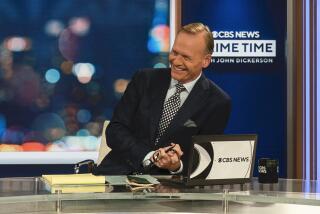Media : Britons Are All Ears for Daily Newsmakers : TV plays second fiddle to BBC’s ‘Today’ radio show, which proudly boasts that it ‘sets the nation’s agenda.’
- Share via
LONDON — When Henry A. Kissinger comes to London with something public to say, he rings up not the television networks or national newspapers but a radio show called “Today.”
“Henry told me after appearing on ‘Tod” recounts Brian Redhead, the show’s senior presenter, “that everyone he met in London told him: ‘Oh, I heard you on “Today.” ’ “
While television may be the medium of choice in the United States, in Britain it is the “Today” show on BBC’s Radio 4 channel that is the showcase for national figures, whether in politics, the arts or industry. The BBC proudly boasts that “Today” is the “program that sets the nation’s agenda.”
And it is certainly the elite’s breakfast show--on Monday through Friday from 6:30 to 9 a.m., and starting on Saturday half an hour later.
When the 18-year veteran Redhead recently announced his intended retirement next year, the competition for his job became a big story. Contenders included well-known television anchors such as Anna Ford, Jeremy Paxman and Peter Snow. It’s as if Peter Jennings, Dan Rather and Tom Brokaw were scrambling frantically to abandon the tube for a spot at National Public Radio.
But “Today” is different. As Redhead says: “Of no other show in the world, on radio or TV, can it be said that most everyone you meet during the day will have heard it. Each morning, we drop a word in the ear of the nation.
“People know that if they go on ‘Today,’ what they say will be heard--and, they hope, understood too,” Redhead adds. “And because of that, presenting ‘Today’ is, I think, the best journalistic job in the country.”
During the program’s 2 1/2 morning hours, all the overnight news is assimilated and freshened with live interviews featuring political figures on all sides of controversial questions.
What they say--Chancellor of the Exchequer Kenneth Clarke on the economy, Foreign Secretary Douglas Hurd on Bosnia-Herzegovina, Home Secretary Michael Howard on crime--often becomes the leading news item for the rest of the day.
To assist Cabinet members in getting on the air, “Today” offers them a choice of coming to the Broadcasting House studio in Central London, jumping into a special radio car outside their homes or using high-quality telephone lines for interviews.
But “Today” also includes reporting of all major world events from BBC’s correspondents throughout the world.
Thus it specializes in analyzing events and examining current issues, including health, culture, education, justice and politics. But it also provides regular time checks, weather, travel, sports and money market headlines.
Its place in the hearts of decision-makers and the so-called “chattering classes” here is assured by its strong, upscale audience: About 6.5 million tune in during the week, more than for any other comparable show. It reaches 84% of members of Parliament.
First broadcast in 1957, “Today” is put together by Editor Roger Mosey, who says: “We have the advantage in being a national program. We try to be at the heart of the national debate. But we try to keep the program varied with light and shade--hard news and lively features.
“When a big story is breaking, like the Soviet coup, we scrap prepared material and ad-lib all through it. Radio has the advantage of flexibility. We don’t need pictures--just a reporter or someone at the end of a phone line.”
“Today” has four presenters who work in pairs: Redhead, Sue MacGregor, John Humphrys and Peter Hobday alternate mornings. Redhead will be succeeded by James Naughtie, who currently presents “The World at One,” a lunchtime public affairs program, and who was previously a political journalist on the Scotsman and the Guardian.
They arrive an hour or so before show time--having read the papers and caught the latest news bulletins--to rough out their scripts and plan their informal presentation. The show itself is tight and fast-paced, with the flexibility to change quickly in order, for example, to prolong particularly interesting interviews.
“I compare it to mixed doubles,” MacGregor, an award-winning broadcaster, says of the shared anchoring arrangement. “It’s relatively unscripted, so you have to make sure you’re not both going for the ball. We try to avoid voice clashes, and it’s like settling into marriage.
“Actually, it’s less demanding when you have a big running story. That takes care of itself. (The problem is) figuring out what to do on a poor news day.”
Why the popularity of a radio current events show?
“I think Radio 4 is a sensible companion in the home,” MacGregor says. “It’s easier to have a one-to-one relationship with radio. Most people will have a radio in the bedroom or bathroom as well as the living room and kitchen. You don’t have to sit in front of a TV set. And you can continue the show in your car.”
The program’s presenters and editor believe that a proper mix continues to be a strong factor in its success.
“It’s very important for us to remember that the program is called ‘Today,’ not ‘Yesterday,’ ” Redhead says, “and the focus is on what is going to happen and what is important today.”
But Editor Mosey adds, “We go for the big interviews, but we also look for odd, funny features about Britain--for example, one on the problems of people with obese pets, or a look at a kind of ‘Gong Show’ that is popular on the south coast.
“We try to send you to work with a smile--if we can.”
More to Read
The complete guide to home viewing
Get Screen Gab for everything about the TV shows and streaming movies everyone’s talking about.
You may occasionally receive promotional content from the Los Angeles Times.






